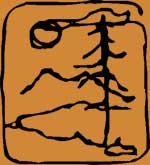
| Program Covenant |
| Program Description |
|
ANNOUNCEMENTS:
(June 10, 2007)
I have upgraded the Program Description
that will be included in my transcript evaluations of your work. The
link to the left will take you to it. Please remember that I am asking
for your evaluation of me, which you should bring to our conference,
along with any later version of your self-evaluation.
Catalogue copy:
AY 2006-07 - Fall, Winter and Spring quarters
Faculty:Charles Pailthorp
Major areas of study include: philosophy (metaphysics, epistemology and moral),
history of philosophy, history of science and writing (expository and argumentative).
Class Standing: Sophomores or above; transfer students welcome.
A central issue in Western philosophy has been whether reason or experience lies at the foundation of human knowledge. Experience can lead us astray, and it seems reason can undercut what we thought we knew best. Does science best tell us what is real and what merely seems to be real? Or when in doubt should we rely most heavily on common sense? Are these questions that we must confront individually, or is our capacity to know things only to be worked out within a community?
At the very least, centuries of discussion and debate have brought such venerable questions into sharper focus and succeeding generations of thinkers have found that earlier answers had to be reconsidered. Surely they remain relevant today in a culture that debates both the role of faith and the relevance of scientific study in determining public policy. Our work in this curriculum will concentrate on the relationship between science and common sense, but we will pay attention as well to the relationship between thought and action, and the relationship between our place in the world as knowers and as moral agents.
Fall quarter, following a short background in ancient thought, we will study works of the 17th- and 18th-centuries Rationalists—Descartes, Spinoza and Leibniz—and Empiricists—Locke, Berkeley and Hume.
Winter quarter we will delve into the challenging work of Kant and Hegel, taking time to discover how this work has set the stage for much that followed in the 20th century.
Spring quarter will bring us to the early 20th century, when disputes between Rationalists vs. Empiricists, and Idealists vs. Realists, were transformed by a “linguistic turn.” Language rather than faculties of mind became the central subject of discussion. “Philosophical Analysis” arose in two main currents: one that flowed from breakthroughs in formal logic, another that found its sources in ordinary language. By mid-century, a profound shift had occurred that undercut the very distinction between “rationalism” and “empiricism”—a shift that laid the groundwork for many currents in “post-modern” thought. Virtually every discipline in the humanities and social sciences has been deeply affected by this mid-century development.
Students will write expository and argumentative essays, learning how to use writing to develop their own thinking about complex issues. They will participate in peer-response exercises both in class and on the Web. Student work will be supported by lectures that present both overviews and details of how specific texts fit into venerable controversies over whether and how humans can progress from mere opinion to secure belief, or even confident certainty.
While the reading will largely be original works in philosophy, we will take time for excursions into literature and other arts.
